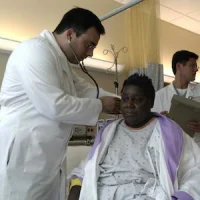Placebos have been used to ease pain and other symptoms for centuries and are used in clinical trials as controls for testing new drug therapies. Citing growing evidence that placebo effects can dramatically enhance the effectiveness of pharmaceutical therapies, a “Perspectives” article in the New England Journal of Medicine (NEJM) proposes a central role for placebos in patient care.
“A significant body of research has resulted in a shift from thinking of placebos as just ‘dummy’ treatments to recognising that placebo effects encompass numerous aspects of the healthcare experience and are central to medicine and patient care,” said the article’s co-author Ted Kaptchuk, director of the programme in placebo studies at Beth Israel Deaconess Medical Center (BIDMC) and professor of medicine at Harvard Medical School.
Bioethicist Franklin Miller, PhD, who recently retired from the National Institutes of Health, co-authored the NEJM article.
The authors define the placebo effect as relief of symptoms that arise from patients’ overall medical encounters including responses to medical symbols (such as medical diplomas prominently displayed on the wall or words on a medication bottle) and, importantly, patient-physician interactions.
“Placebos don’t necessarily provide cures, but they provide relief. In medical situations in which no cure is available, supportive and attentive healthcare can help patients to feel better, and when effective drugs do exist, placebo effects can enhance their impact,” Prof. Kaptchuk said.
The article notes how placebo effects can help enhance the effectiveness of drug therapies, as shown in studies of patients with episodic migraine, asthma and irritable bowel syndrome. In fact, clinicians themselves can create a placebo effect through empathy and support, according to the article.
“Placebo effects occur when patients are immersed in the emotional circumstances of illness, and their brains unleash chemicals that help to modulate their symptoms and change the experience of illness," Prof. Kaptchuk explained. "We are sometimes so busy demonstrating that a therapy is ‘more than a placebo,’ we forget that the effects of symbols and therapeutic encounters can be valuable in and of themselves and that these and other ‘placebo effects’ are foundational to medicine as a healing profession.”
The article also notes that psychosocial factors that promote therapeutic placebo effects have the potential to cause adverse consequences, known as nocebo effects.
“Not infrequently, patients perceive side effects of medications that are actually caused by anticipation of negative effects,” the authors write. “Therefore, finding a way to balance the need for full disclosure of potential adverse effects of drugs with the desire to avoid inducing nocebo effects is a pressing issue in healthcare.”
Source: Beth Israel Deaconess Medical Center
Image credit: Flickr.com
“A significant body of research has resulted in a shift from thinking of placebos as just ‘dummy’ treatments to recognising that placebo effects encompass numerous aspects of the healthcare experience and are central to medicine and patient care,” said the article’s co-author Ted Kaptchuk, director of the programme in placebo studies at Beth Israel Deaconess Medical Center (BIDMC) and professor of medicine at Harvard Medical School.
Bioethicist Franklin Miller, PhD, who recently retired from the National Institutes of Health, co-authored the NEJM article.
The authors define the placebo effect as relief of symptoms that arise from patients’ overall medical encounters including responses to medical symbols (such as medical diplomas prominently displayed on the wall or words on a medication bottle) and, importantly, patient-physician interactions.
“Placebos don’t necessarily provide cures, but they provide relief. In medical situations in which no cure is available, supportive and attentive healthcare can help patients to feel better, and when effective drugs do exist, placebo effects can enhance their impact,” Prof. Kaptchuk said.
The article notes how placebo effects can help enhance the effectiveness of drug therapies, as shown in studies of patients with episodic migraine, asthma and irritable bowel syndrome. In fact, clinicians themselves can create a placebo effect through empathy and support, according to the article.
“Placebo effects occur when patients are immersed in the emotional circumstances of illness, and their brains unleash chemicals that help to modulate their symptoms and change the experience of illness," Prof. Kaptchuk explained. "We are sometimes so busy demonstrating that a therapy is ‘more than a placebo,’ we forget that the effects of symbols and therapeutic encounters can be valuable in and of themselves and that these and other ‘placebo effects’ are foundational to medicine as a healing profession.”
The article also notes that psychosocial factors that promote therapeutic placebo effects have the potential to cause adverse consequences, known as nocebo effects.
“Not infrequently, patients perceive side effects of medications that are actually caused by anticipation of negative effects,” the authors write. “Therefore, finding a way to balance the need for full disclosure of potential adverse effects of drugs with the desire to avoid inducing nocebo effects is a pressing issue in healthcare.”
Source: Beth Israel Deaconess Medical Center
Image credit: Flickr.com
References:
Kaptchuk TJ, Miller FG (2015) Placebo Effects in Medicine. New England Journal of Medicine, 2015; 373 (1): 8 DOI: 10.1056/NEJMp1504023
Latest Articles
healthmanagement, patient care, placebos, empathy, placebo effect, patient-physician interaction
Citing growing evidence that placebo effects can dramatically enhance the effectiveness of pharmaceutical therapies, a “Perspectives” article in the New England Journal of Medicine (NEJM) proposes a central role for placebos in patient care.


![Tuberculosis Diagnostics: The Promise of [18F]FDT PET Imaging Tuberculosis Diagnostics: The Promise of [18F]FDT PET Imaging](https://res.cloudinary.com/healthmanagement-org/image/upload/c_thumb,f_auto,fl_lossy,h_184,q_90,w_500/v1721132076/cw/00127782_cw_image_wi_88cc5f34b1423cec414436d2748b40ce.webp)







